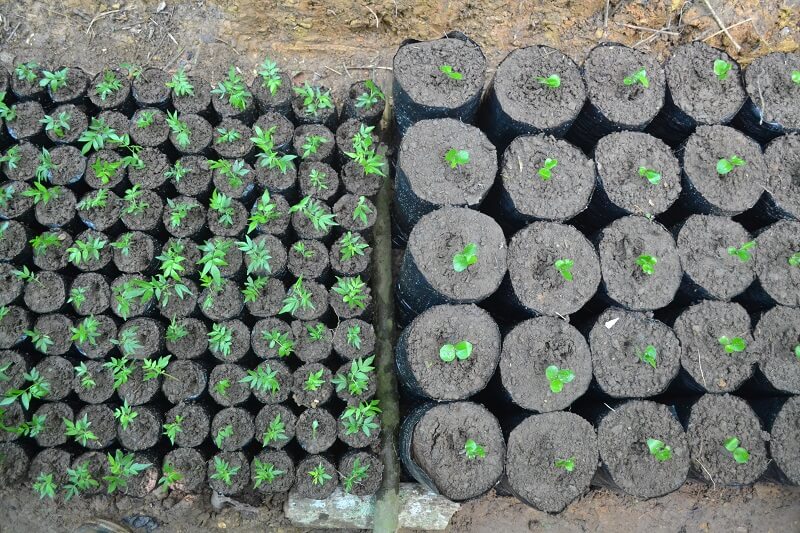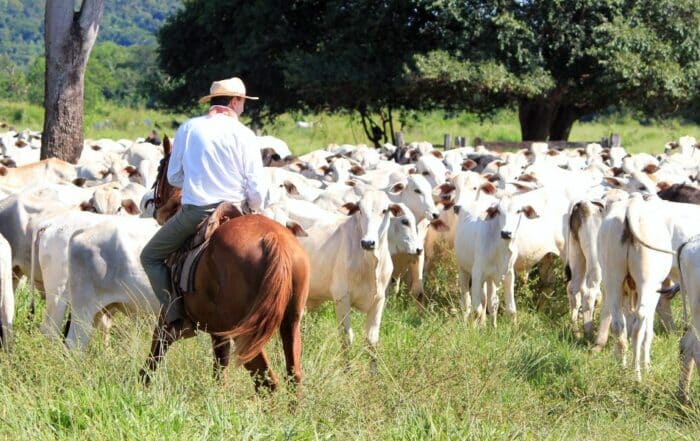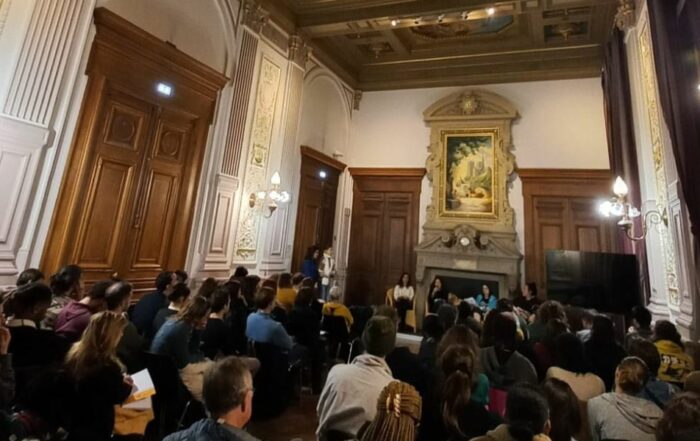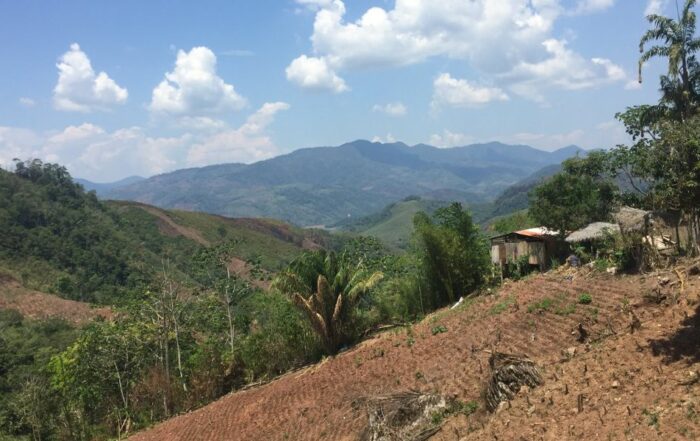The key numbers
– 20 083 trees planted
– 500 acres reforested and converted to agroforestry
– 15 nurseries built or renovated in as many villages
– 192 farmers’ families committed to each stage, from nursery management to tree planting
– 33 training days for over 339 attendees covering multiple themes linked to agroforestry and responsible land management
– 15 projects to raise environmental awareness among local children, uniting over 170 participants
– 3 Co-operatives involved on a daily basis with support from more than 5 institutions and associations
2017 confirmed the growing popularity of our “Agroforestry and Coffee” project with an increase in the number of trees planted of around 10% vs 2016. The primary focus was on diversifying local species and building autonomy among participants.
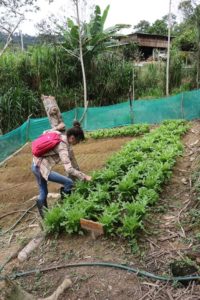 The volunteers’ nurseries welcomed 16 tree species, with those for the still important production of timber now alongside fruit trees to meet the dual objectives of food sovereignty and additional income generation. This programme, rich in training at every meeting, encourages reasoned management of the land plots (use of organic treatments, sensible forest stewardship, wood source labelling…) to move towards a long-term change in behavior and continued reforestation.
The volunteers’ nurseries welcomed 16 tree species, with those for the still important production of timber now alongside fruit trees to meet the dual objectives of food sovereignty and additional income generation. This programme, rich in training at every meeting, encourages reasoned management of the land plots (use of organic treatments, sensible forest stewardship, wood source labelling…) to move towards a long-term change in behavior and continued reforestation.
To promote this diversification, two demonstration land plots were set up to showcase plot management and planning and also show how diverse revenue streams can be generated through using combined resources. These complete farms also boast, among other assets, forest food gardens, organic vegetable plots and they bring additional research and thought to specific challenges such as irrigation.
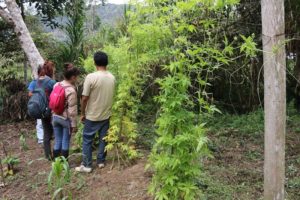 So, following this theme, last November, the first visit was organized to a farm which joined the programme 7 years earlier and has since successfully implemented innovative agroforestry techniques. This was a unique opportunity for representatives of the 13 villages enrolled in 2017 to meet and exchange around a common goal, an important first step towards self-reliance and farmer empowerment.
So, following this theme, last November, the first visit was organized to a farm which joined the programme 7 years earlier and has since successfully implemented innovative agroforestry techniques. This was a unique opportunity for representatives of the 13 villages enrolled in 2017 to meet and exchange around a common goal, an important first step towards self-reliance and farmer empowerment.
Once again this year the “Agroforestry and Coffee” project was supported by many local and international partners. One notable new partnership with the university association PERUNIDAD produced some awareness building activities among youth as 4 students spent 6 weeks on site.
« Previously the idea of co-operatives was all but invisible but I have come to realise working together is really quite a pleasant thing, including for the producers, they can exchange with and encourage each other, as a result, the typical producer feels much better” Julio Antonio Wilbert Esteban, project agricultural engineer.
More about the project “Reforestation and Agroforestry”
The key numbers
– 20 083 trees planted
– 500 acres reforested and converted to agroforestry
– 15 nurseries built or renovated in as many villages
– 192 farmers’ families committed to each stage, from nursery management to tree planting
– 33 training days for over 339 attendees covering multiple themes linked to agroforestry and responsible land management
– 15 projects to raise environmental awareness among local children, uniting over 170 participants
– 3 Co-operatives involved on a daily basis with support from more than 5 institutions and associations
2017 confirmed the growing popularity of our “Agroforestry and Coffee” project with an increase in the number of trees planted of around 10% vs 2016. The primary focus was on diversifying local species and building autonomy among participants.
 The volunteers’ nurseries welcomed 16 tree species, with those for the still important production of timber now alongside fruit trees to meet the dual objectives of food sovereignty and additional income generation. This programme, rich in training at every meeting, encourages reasoned management of the land plots (use of organic treatments, sensible forest stewardship, wood source labelling…) to move towards a long-term change in behavior and continued reforestation.
The volunteers’ nurseries welcomed 16 tree species, with those for the still important production of timber now alongside fruit trees to meet the dual objectives of food sovereignty and additional income generation. This programme, rich in training at every meeting, encourages reasoned management of the land plots (use of organic treatments, sensible forest stewardship, wood source labelling…) to move towards a long-term change in behavior and continued reforestation.
To promote this diversification, two demonstration land plots were set up to showcase plot management and planning and also show how diverse revenue streams can be generated through using combined resources. These complete farms also boast, among other assets, forest food gardens, organic vegetable plots and they bring additional research and thought to specific challenges such as irrigation.
 So, following this theme, last November, the first visit was organized to a farm which joined the programme 7 years earlier and has since successfully implemented innovative agroforestry techniques. This was a unique opportunity for representatives of the 13 villages enrolled in 2017 to meet and exchange around a common goal, an important first step towards self-reliance and farmer empowerment.
So, following this theme, last November, the first visit was organized to a farm which joined the programme 7 years earlier and has since successfully implemented innovative agroforestry techniques. This was a unique opportunity for representatives of the 13 villages enrolled in 2017 to meet and exchange around a common goal, an important first step towards self-reliance and farmer empowerment.
Once again this year the “Agroforestry and Coffee” project was supported by many local and international partners. One notable new partnership with the university association PERUNIDAD produced some awareness building activities among youth as 4 students spent 6 weeks on site.
« Previously the idea of co-operatives was all but invisible but I have come to realise working together is really quite a pleasant thing, including for the producers, they can exchange with and encourage each other, as a result, the typical producer feels much better” Julio Antonio Wilbert Esteban, project agricultural engineer.
More about the project “Reforestation and Agroforestry”

